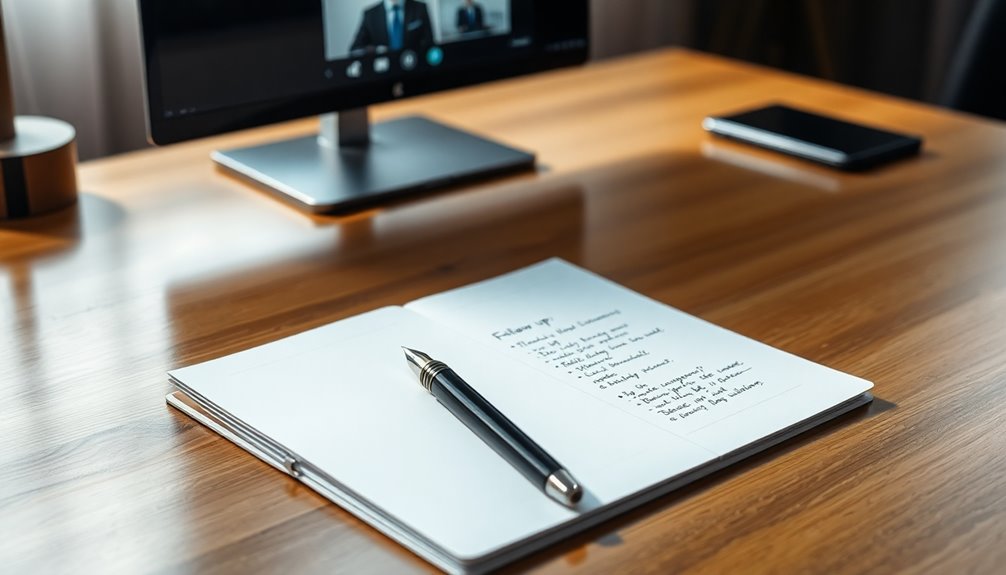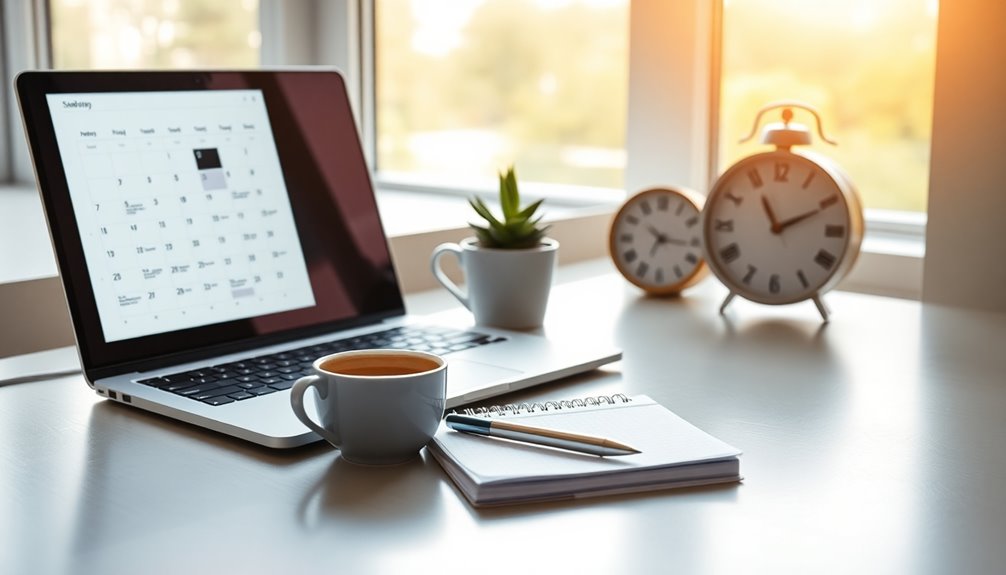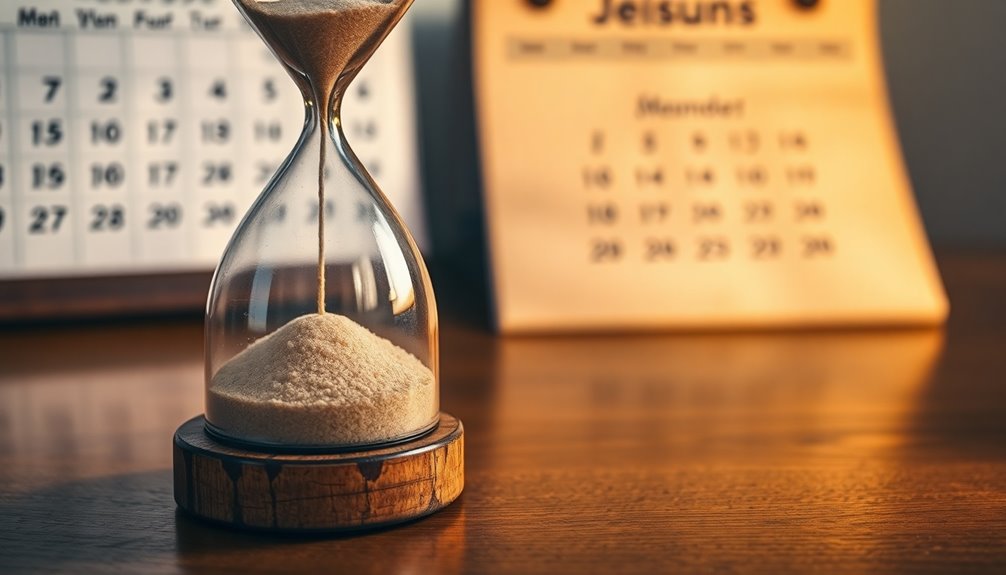After your interview, asking follow-up questions shows your interest and helps clarify any uncertainties. Consider asking about the essential skills needed for success in the role or how the team dynamics work. Inquire about the next steps in the hiring process to understand the timeline. Expressing curiosity about company culture can also enhance your impression. Personalize your message by referring to specific topics discussed during the interview, reinforcing your enthusiasm. These thoughtful inquiries not only engage the interviewer but can also set you apart from other candidates. You'll discover more tips to excel in your follow-up approach.
Key Takeaways
- Inquire about essential skills for success in the role to gauge alignment with your qualifications.
- Ask about the team dynamics to understand the company culture better.
- Clarify the next steps in the hiring process to stay informed and engaged.
- Seek feedback on any unanswered questions from the interview to address concerns.
- Express interest in ongoing projects or initiatives to show enthusiasm for the role.
Importance of Follow-Up
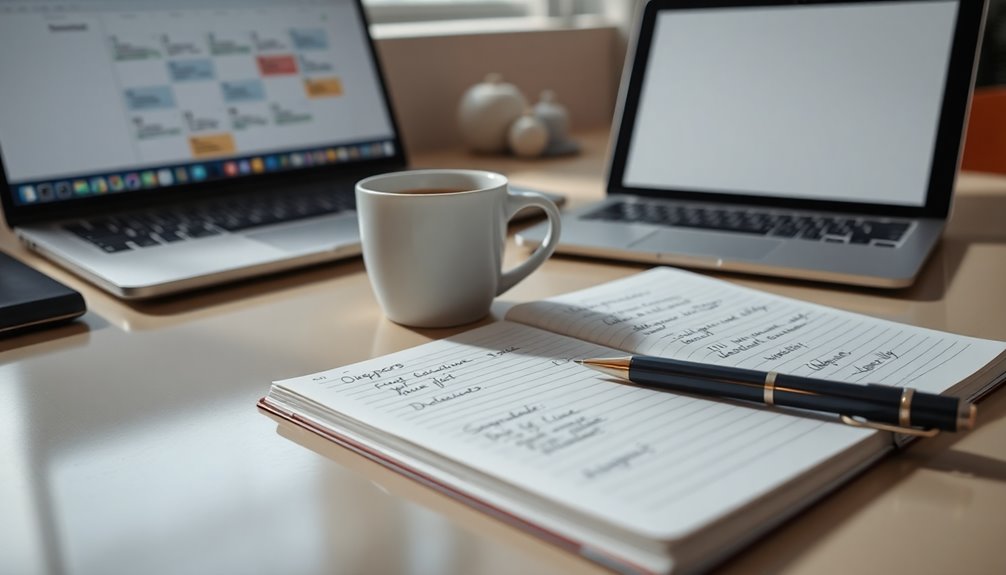
Follow-up after an interview is essential—it's your chance to stand out and reinforce your interest in the position. It demonstrates your enthusiasm for the company and the role, showing that you value the opportunity.
A thoughtful follow-up can enhance the impression you made during the interview, keeping you top of mind as the hiring team evaluates candidates. It also provides a perfect avenue to clarify any job duties or address unanswered questions, ensuring you present yourself as a proactive candidate.
Additionally, this gesture shows respect for the interviewer's time, helping maintain momentum in the hiring process. Ultimately, a well-crafted follow-up can positively influence hiring decisions and set you apart from other candidates.
Timing and Method
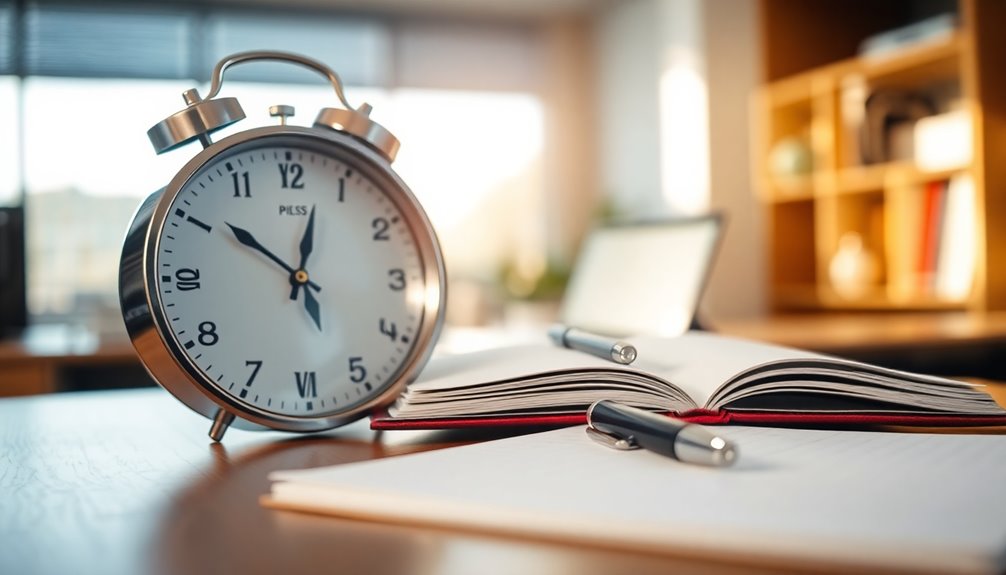
Timing your follow-up is key to making a lasting impression after an interview. Aim to send your message within 24 to 48 hours. This window shows enthusiasm without coming off as overly enthusiastic.
Email is typically the best method for follow-up; it's professional, quick, and widely accepted. If you want to add a personal touch, consider sending a handwritten note, but reserve this for situations where it feels appropriate.
In some cases, a phone call might also be suitable, especially if the interviewer mentioned it during your conversations. Be cautious with social media; it can be effective, but verify it aligns with the company's culture.
Choose your method wisely to reinforce your interest and professionalism.
Personalizing Your Message
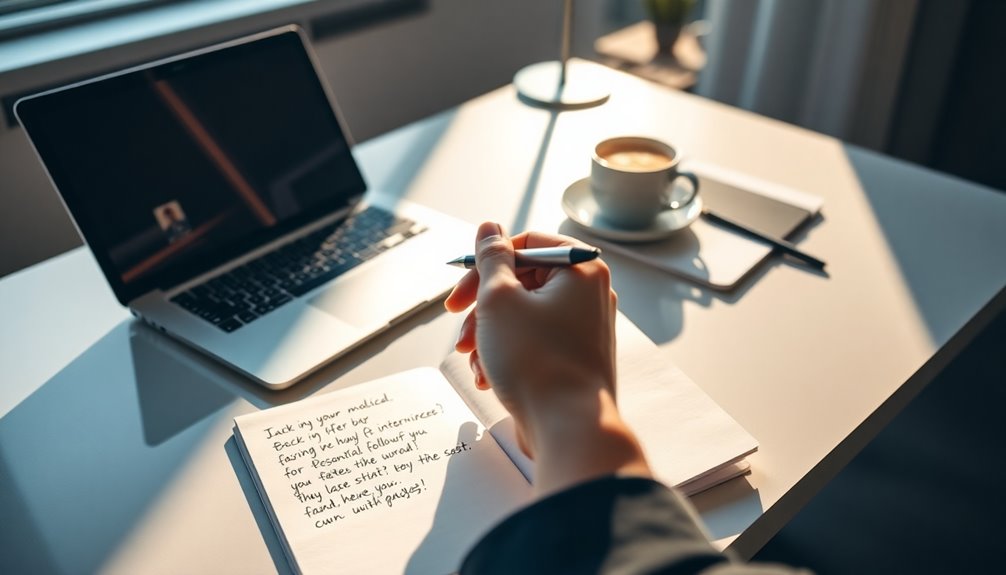
To make your follow-up message stand out, tailor it specifically to the interviewer and the conversation you had. Start by thanking them for their time and mention something specific from your discussion. This shows you were engaged and care about the position.
Recap key points that highlight your skills and enthusiasm for the role, reinforcing why you're a great fit. If there were any questions left unanswered during the interview, address them in your message.
Avoid generic templates; instead, personalize your content to reflect your unique interaction. This approach not only shows your dedication but also helps you remain memorable in their minds, enhancing your chances in the hiring process. Additionally, consider networking strategies to connect further with your interviewer and demonstrate your proactive approach to building professional relationships.
Subject Line and Length
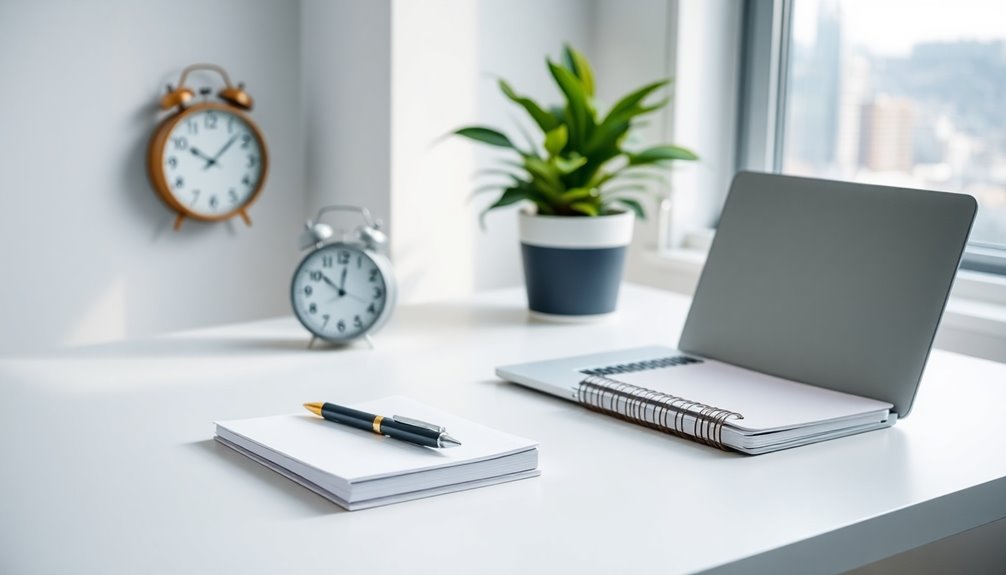
When it comes to length, aim for a brief message of just 1-2 paragraphs. Focus on key points, like expressing gratitude and reiterating your interest in the role, while respecting the interviewer's time.
Key Follow-Up Questions
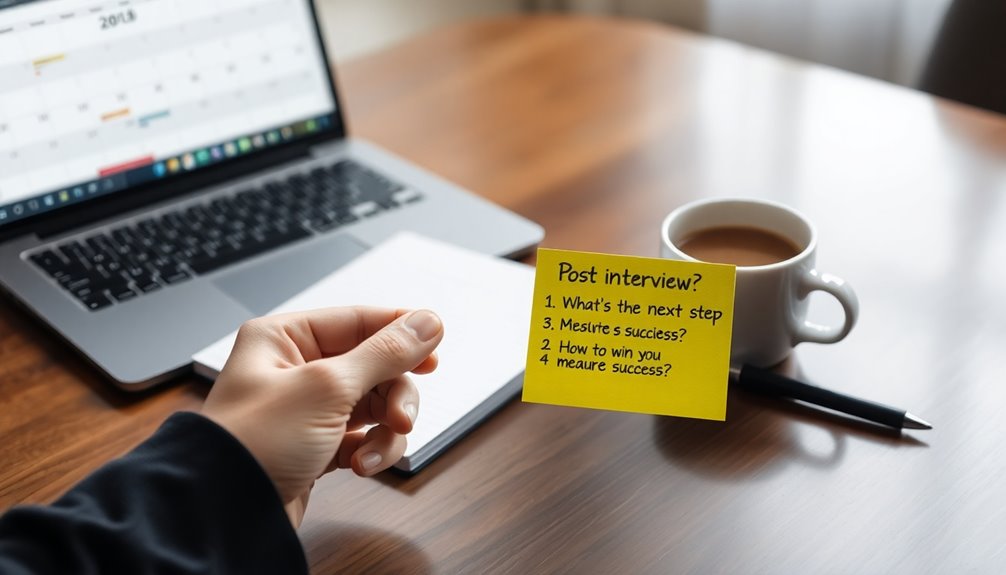
After an interview, it's important to ask the right follow-up questions to demonstrate your engagement and gather valuable insights. Key questions can guide your understanding of the role and the company. Here are some effective follow-up questions you might consider:
| Question Type | Example Questions | Purpose |
|---|---|---|
| Role-Specific | What skills are vital for success in this role? | Understand expectations |
| Company Culture | How would you describe the team dynamics here? | Gauge workplace environment |
| Next Steps | What are the next steps in the hiring process? | Clarify timeline for decision-making |
These inquiries not only show your interest but also help you assess if the job aligns with your career aspirations.
Handling Delays
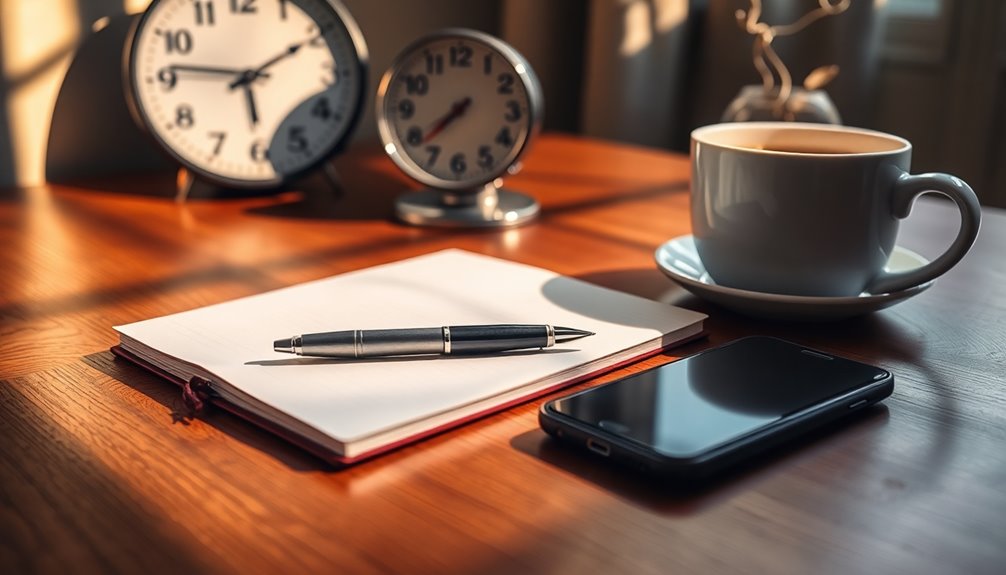
Patience is essential in the hiring process, especially when you encounter delays. Hiring decisions can take time, and it's vital not to jump to conclusions.
If you haven't heard back after your interview, wait about a week before sending a polite follow-up email. In your message, express your continued interest in the role and inquire about the status of your application.
If you've had multiple interviews, consider sending separate thank-you notes to each interviewer, highlighting unique discussions you'd with them. This shows respect for their time and reinforces your enthusiasm for the team.
Leveraging LinkedIn

Utilizing LinkedIn effectively can enhance your follow-up strategy after interviews. Start by connecting with your interviewers on the platform. When you send a connection request, include a brief message thanking them for their time and expressing your continued interest in the role. This personal touch can help solidify your relationship.
Additionally, engage with their posts by commenting or sharing relevant articles that resonate with their interests or industry trends. This not only keeps you visible but also demonstrates your ongoing enthusiasm for the field. Remember to incorporate data-driven marketing strategies into your follow-up communications to further showcase your proactive approach.
Always guarantee your interactions remain professional and aligned with the company culture. By leveraging LinkedIn in this way, you can maintain connections that may benefit you both now and in the future.
Maintaining Professional Tone

- Use courteous language and proper grammar.
- Avoid slang or overly casual expressions.
- Tailor your tone to align with the company culture.
- Keep your message positive and constructive. Being aware of your credit score can also influence how potential employers perceive your financial responsibility, reflecting on your overall professionalism.
Frequently Asked Questions
How Often Should I Send Follow-Up Messages?
You should send follow-up messages within 24-48 hours after your interview.
This timeframe helps you express your gratitude while keeping your interest fresh in the interviewer's mind.
If you don't hear back after a week or so, it's okay to send a gentle reminder.
Just remember, you don't want to overwhelm them, so limit follow-ups to a couple of times unless they indicate otherwise.
Keep it professional and respectful!
What if I Don't Hear Back After My Follow-Up?
If you don't hear back after your follow-up, don't throw in the towel just yet.
It's wise to wait a week or so before sending a gentle nudge. Keep it light and respectful, expressing your continued interest and inquiring about any updates.
Should I Follow up if I Was Rejected?
Yes, you should definitely follow up if you were rejected.
Sending a thank-you note shows professionalism and appreciation for the opportunity. It's a chance to express your interest in future openings and ask for feedback on your interview performance.
This approach keeps the door open for potential opportunities down the line and helps you maintain a positive relationship with the company, which could be valuable in your job search.
Can I Follow up With Multiple Interviewers?
Absolutely, you can follow up with multiple interviewers!
It's a smart strategy that shows your sincere interest and strengthens your standing. Send each interviewer a personalized note, thanking them for their time and highlighting unique discussions.
This thoughtful touch not only keeps you fresh in their minds but also fosters favorable feelings toward you.
Is It Appropriate to Follow up After a Group Interview?
Yes, it's absolutely appropriate to follow up after a group interview. You should reach out within 24-48 hours to express your gratitude for the opportunity.
In your message, mention specific points discussed during the interview to personalize your note. This not only reinforces your interest in the position but also helps you stand out among other candidates.
Just guarantee your tone remains professional and upbeat throughout your communication.
Conclusion
In the grand tapestry of your job search, a thoughtful follow-up can weave the threads of opportunity and connection into a masterpiece. By asking the right questions, you not only demonstrate your keen interest but also pave the way for fruitful conversations. Remember, this isn't just a formality; it's your chance to shine and showcase your enthusiasm. Embrace the follow-up as a stepping stone, and watch how it can elevate your prospects in this competitive landscape.
